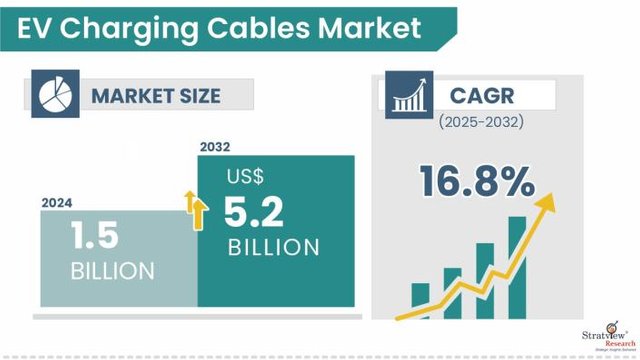EV Charging Cables Market: Enabling the Future of Electric Mobility
As the adoption of electric vehicles (EVs) grows globally, the need for efficient, safe, and reliable charging infrastructure has become critical. At the heart of this infrastructure are EV charging cables, which facilitate the transfer of electrical power from charging stations to electric vehicles. These cables play a crucial role in ensuring fast, efficient, and secure charging, making them an integral part of the electric vehicle ecosystem.
According to Stratview Research, the EV Charging Cables Market is expected to grow at a CAGR of 16.8%, reaching USD 5.2 billion by 2032. This growth is driven by the rising adoption of electric vehicles, increasing demand for fast-charging solutions, and the need for improved charging infrastructure.
Request a sample report to preview our in-depth analysis:
https://stratviewresearch.com/Request-Sample/1092/EV-charging-cables-market.html#form
What Are EV Charging Cables?
EV charging cables are specialized cables designed to connect electric vehicles to charging stations. These cables come in various types and standards, including Type 1, Type 2, and CHAdeMO, and are used for different charging levels such as Level 1, Level 2, and DC fast charging. The cables are designed to handle high currents safely and efficiently while ensuring compatibility with different EV models and charging stations.
Key Applications of EV Charging Cables
1. Public Charging Stations:
EV charging cables are widely used at public charging stations, where electric vehicle owners can charge their vehicles quickly and conveniently. The growing network of public charging stations is boosting the demand for fast-charging cables that enable rapid energy transfer.
2. Residential Charging:
Home-based charging solutions often use Level 1 or Level 2 charging cables for EV owners who want to charge their vehicles overnight. These cables are crucial for ensuring convenience and reliability in home-based charging setups.
3. Commercial and Fleet Charging:
Commercial fleets and fleet owners are increasingly adopting DC fast chargers and Level 3 charging stations to optimize their charging infrastructure. The demand for high-performance cables that support fast and efficient charging is growing rapidly in this sector.
Market Drivers for EV Charging Cables
1. Rising Demand for Electric Vehicles:
The growth of the electric vehicle market is the primary driver of the EV charging cables market. As more consumers transition to electric mobility, the need for reliable and accessible charging solutions, including cables, is becoming essential.
2. Government Initiatives and Incentives:
Governments worldwide are incentivizing the adoption of electric vehicles by offering subsidies and tax incentives. Additionally, governments are investing in the expansion of charging infrastructure, including the installation of EV charging cables in public and residential spaces.
3. Technological Advancements in Charging Systems:
Advancements in fast-charging technologies and the development of universal charging standards are boosting the demand for advanced EV charging cables that can support higher power capacities and faster charging speeds.
Challenges in the EV Charging Cables Market
1. Standardization and Compatibility Issues:
The lack of standardization in charging cable types and connectors can cause compatibility issues between different EV models and charging stations, limiting the efficiency of charging infrastructure.
2. Cost and Infrastructure Challenges:
The cost of deploying fast-charging stations and the installation of compatible cables remains high. Companies and governments must address these infrastructure challenges to make EV charging accessible and affordable for all.
Conclusion
The EV Charging Cables Market is set to experience significant growth as the demand for electric vehicles and charging infrastructure continues to rise. As the market evolves, innovations in charging cables will play a critical role in ensuring the speed, efficiency, and accessibility of charging solutions worldwide.
